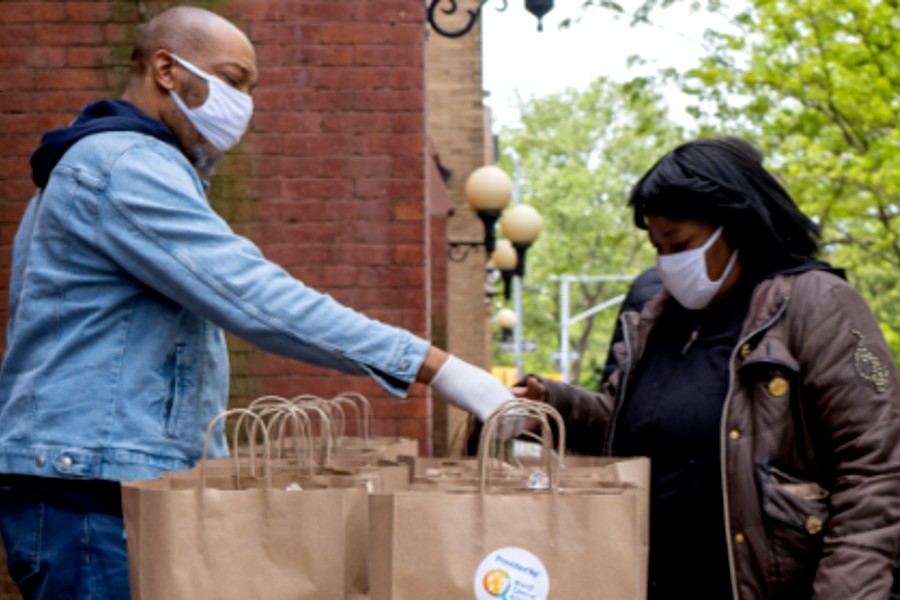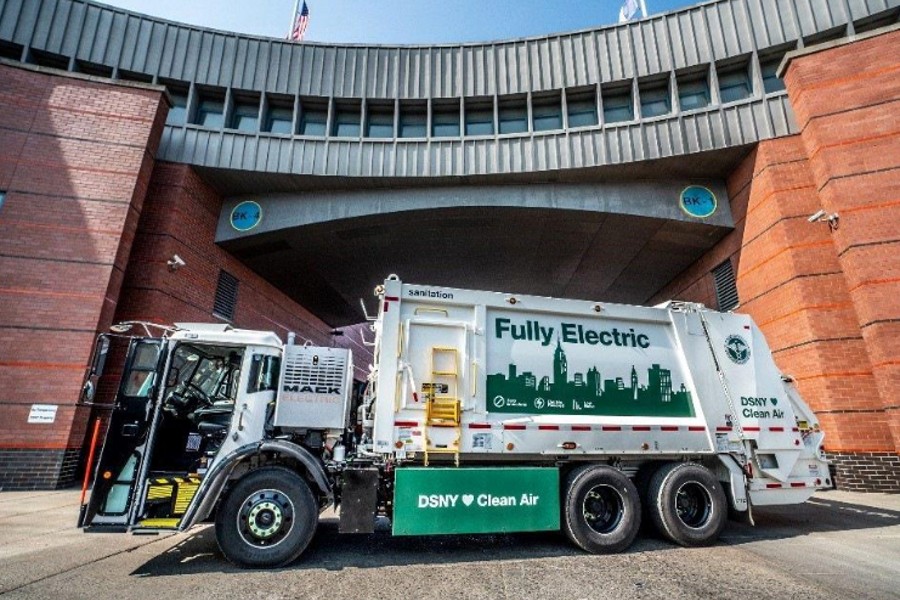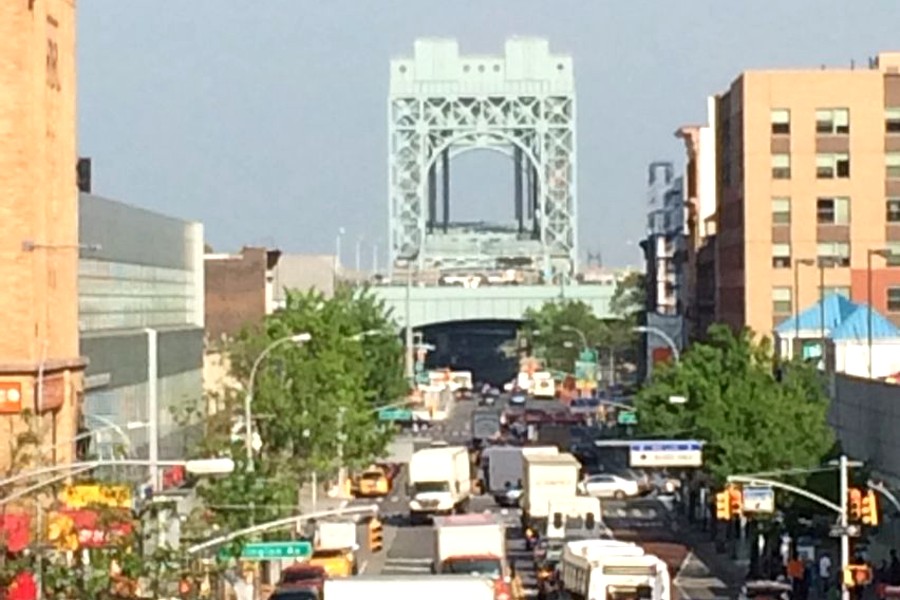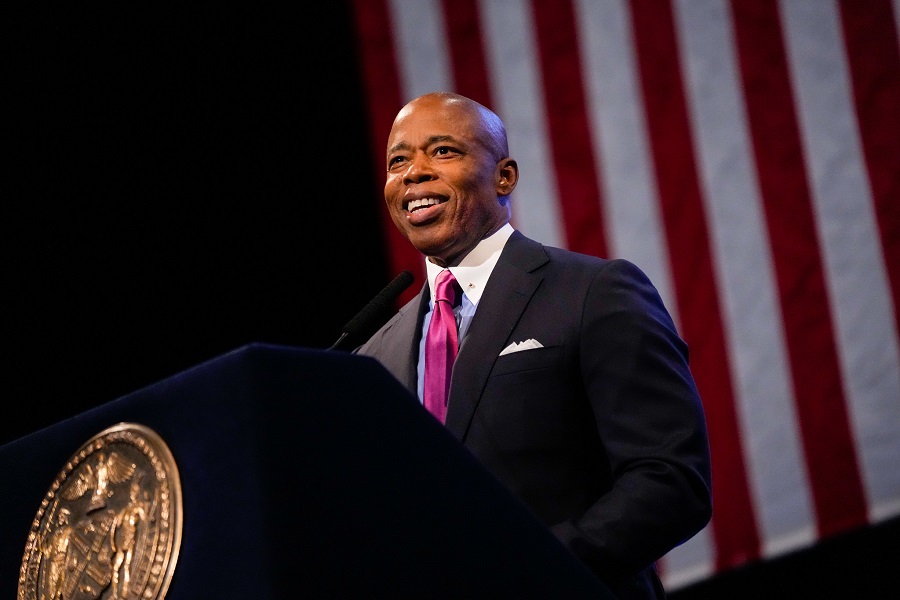
New York City Mayor Eric Adams today marked the conclusion of a two-day summit on the fentanyl crisis in America that brought elected leaders, public health officials.
Law enforcement professionals from across the country to New York City to work towards a national strategy to combat fentanyl overdoses. The summit was held yesterday and included representatives from major cities across the nation, including Los Angeles, CA; Philadelphia, PA; Washington, DC; New Orleans, LA; and more, and included strategy sessions focused on education, enforcement, awareness, prevention, and treatment.
“The national fentanyl crisis has taken far too many New Yorkers and Americans far too soon — including one-year-old Nicholas Dominici last month. But, as we are alarmed by the dangers of this drug, this group of local leaders is not going to sit back and let what happened to prior generations happen to our babies and families,” said Mayor Adams. “I am grateful to everyone who traveled across the country to share the best practices and creative ideas we’ll need to tackle this urgent epidemic. Together, we can work towards a day when we can stop the flow of fentanyl into our cities, hold bad actors accountable, and protect New Yorkers and all Americans from this dangerous drug so no family needs to be devastated by this poison again.”
“Throughout the last two days, leaders from across New York City and key cities across the country came together to discuss the opioid crisis,” said Deputy Mayor for Health and Human Services Anne Williams-Isom. “Opioids claim the lives of thousands here in the city and tens of thousands across the country every year, and this summit provided an opportunity to exchange ideas, learn from intervention models across municipalities, and help build a strategy to tackle one of the most important public health and public safety issues of our time. Ultimately, the summit is a meeting full of hope for what is possible, as we build out interventions that we know work and that have helped us slow the pace of overdoses.”
“Behind every statistic, every policy, and every solution we discussed over the past two days, there are real lives at stake,” said Deputy Mayor for Public Safety Philip Banks III. “We had cities here from across the country reeling from the same devastating impacts that we’re feeling here but who are taking different approaches than we are to address it, so this conversation was extremely valuable. A crisis of this magnitude cannot be solved overnight, and we look forward to continuing this work together.”
“The fentanyl crisis has cut across a wide swath of our nation, affecting people from all walks of life in every neighborhood,” said New York City Police Department (NYPD) Commissioner Edward A. Caban. “To combat this scourge locally, the NYPD and our law enforcement partners are relentless in our efforts to shut down illegal narcotics manufacturers and suppliers, to hold those involved in drug operations fully accountable, and, ultimately, to save lives. The ideas discussed at this valuable summit can surely help form the basis for a national strategy that keeps all Americans safe.”
“This is a crisis that demands imagination, ingenuity, and intentional strategy and partnerships,” said New York City Department of Health and Mental Hygiene (DOHMH) Commissioner Dr. Ashwin Vasan. “By bringing together leaders from across the nation, we can share information about what New York City can teach as well as learn. By bringing together public health and public safety officials, Mayor Adams demonstrates the need to address downstream treatment, harm reduction, and overdose prevention, while cutting off upstream supply. Overdose affects all of us — in our respective cities, as well as our personal lives. We can and must do everything in our power to save lives, and cities will lead the way.”
“As the largest municipal hospital system, we are on the front lines of this crisis every day,” said NYC Health + Hospitals (H+H) President and CEO Mitchell Katz, MD. “We are engaging people wherever they are touching our system — in our hospital settings such as the emergency departments, in the community, or on the street through our Street Health Outreach and Wellness vans. Our goal is to get patients connected to care wherever they are most comfortable. I want to thank Mayor Adams for his commitment to this issue as we address this together with our city partners.”
“Stationed at the intersection of public health and safety, our office recognizes that collaboration and innovation are needed to solve the fentanyl crisis ravaging communities across the country,” said New York City Chief Medical Examiner Dr. Jason Graham. “The fentanyl summit convened by Mayor Adams presents a powerful opportunity to work with our colleagues across jurisdictions and disciplines on meaningful strategies to end overdoses and save lives.”
“The fentanyl crisis in our cities demands sustained, long-term strategies that tackle the problem at its root,” said Mayor’s Office of Criminal Justice Director Deanna Logan. “Mayor Adams’ leadership has brought together jurisdictions across the country to share the law enforcement and public health best practices and innovative strategies that save lives. I look forward to continued partnership with our fellow cities as we confront this crisis.”
At this week’s summit, health care professionals, elected leaders, and law enforcement officials from across the country shared best practices on education and prevention strategies, treatment, harm reduction, law enforcement, funding strategies, and legislative action. Practitioners discussed innovative strategies for tackling the dire circumstances surrounding the fentanyl crisis and developing and implementing effective cross-sector approaches to the fentanyl emergency.
Topics specifically included harm reduction programs that are designed to lead to less risky activity and better health outcomes, engagement with community members and law enforcement, recovery strategies directed at young people, and the combination of law enforcement and public health strategies to reduce overdose deaths.
At the conclusion of the summit, participants agreed on several action items to guide the development of a national strategy to address the ongoing fentanyl crisis:
- Formalizing a multi-city task force that will pilot innovative strategies;
- Drafting a white paper outlining national best practices and opportunities;
- Enhance data-sharing on a national level to ensure accurate and timely coordination around lab and overdose data, including neighborhood-level data;
- Defining terms for cities across the nation to reduce the stigma around addiction and substance abuse and standardize communication among policymakers, public health professionals, community-based organizations, and other stakeholders;
- Increasing collaboration and communication among key public health and public safety stakeholders in municipalities across the country; and
- Identifying city, state, and national funding and legislative needs to prevent overdose deaths and save lives.
The summit included New York City officials on the front lines of this crisis including DOHMH Commissioner Dr. Vasan, H+H CEO Dr. Katz, and Chief Medical Examiner Dr. Graham, who opened the summit with a panel conversation on the prevention of overdoses and overdose deaths. New York City Special Narcotics Prosecutor Bridget Brennan discussed her office’s efforts to combat fentanyl from a law enforcement perspective. The summit concluded with consideration of steps to advance the most effective strategies for tackling the fentanyl crisis.
In addition to members of the Adams administration, the summit included representatives from Los Angeles County, CA; Philadelphia, PA; New Orleans, LA; Dallas and Laredo, TX; New Haven, CT; and the U.S. Drug Enforcement Administration’s New York division. New York City district attorneys were also represented, including Bronx District Attorney Darcel Clark and Staten Island District Attorney Michael McMahon.
Fentanyl is now the most common drug involved in overdose deaths in New York City, including the death of a one-year-old Nicholas Dominici in the Bronx last month. Drug overdoses killed 2,668 individuals in New York City in 2021 — a 78 percent increase since 2019 — with fentanyl detected in 80 percent of those deaths.
“The New York City Mayoral Fentanyl Summit focused on two of the most urgent public safety and health threats in our city,” said Drug Enforcement Agency (DEA) Special Agent in Charge Frank Tarentino. “Fentanyl and other dangerous synthetic drugs are taking too many lives too soon and the DEA New York Division embraced the opportunity to participate in this important event to collaborate with representatives from New York public health, law enforcement, educators, first responders, and drug prevention and treatment specialists. The DEA commends Mayor Adams and his team for their hard work throughout this summit and continued focus on saving lives from fentanyl poisonings.”
“The overdose crisis continues to cause immeasurable, irrevocable harm to our communities – both in Philadelphia and nationally,” said Philadelphia Mayor Jim Kenney. “While cities strive to make progress on many fronts, more work is needed to stay ahead of this evolving, deadly crisis. The rise in fatal overdoses and rapidly emerging racial disparities require our cities to pivot in our overdose response. We need new tools, new awareness, and new information to stay ahead of this fast-evolving crisis, and we are grateful to the City of New York for convening us to amplify and accelerate this work.”
“We know opioid abuse is a relentless battle in the City of Yonkers and in cities across the country,” said Yonkers Mayor Mike Spano. “Thank you to Mayor Adams and his administration for leading the charge in uniting our cities to strategize against this nationwide crisis. The City of Yonkers looks forward to continued collaboration with our partners to help improve the quality of life for our residents and their families.”
“We know that harm reduction saves lives and in Washington DC we are keenly aware that interventions across the harm reduction spectrum are vital in reducing and preventing fatalities from opioid overdoses,” said Washington, D.C. Interim Deputy Mayor for Health and Human Services Ciana Creighton. “The double endemic and pandemic of fentanyl and COVID-19 created new challenges that we believe we can overcome with the right approach.”
“I just attended a national fentanyl summit in New York City called by New York City Mayor Eric Adams, to talk with and learn from my colleagues around the county about ways to address this horrible drug called fentanyl,” said Louisville Deputy Mayor for Emergency Services David James. “I want to thank Mayor Adams for organizing this very important summit and thank Mayor Greenberg for sending me.”
“Mayor Adams’ fentanyl summit affirmed what we’ve seen in Dallas — this is a national public health crisis,” said Dallas City Councilmember Adam Bazaldua, co-chair, City of Dallas Opioid Response Strike Force. “Bringing everyone together is the only way to move forward effectively. Breaking down silos not only affords us the opportunity to learn best practices, but also helps streamline consistency in our efforts to combat this epidemic. I look forward to hosting our peer cities in Dallas in January.”
“The summit was a phenomenal opportunity to connect with colleagues from across the country to learn more about best practices and have the space to brainstorm common solutions to a very complex issue,” said Carlos Sosa-Lombardo, executive director, New Haven Department of Community Resilience.
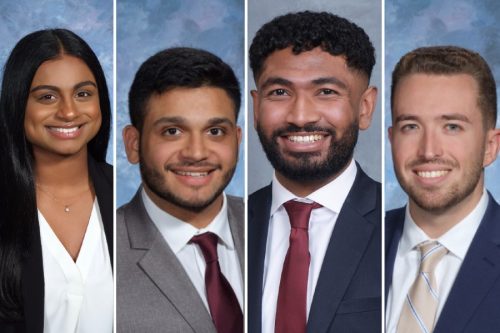
- Ballet Hispánico’s Quinceañera Gala Raises Over $1.3 Million For Arts And Community
- FTC Investigating TikTok Over Data Privacy Protocols From Harlem To Hollywood
- Sponsored Love: Unveiling SEO Success, The Power Of Paid Guest Post Services On Fiverr
- Black Public Media Awards For Film And Immersive Media Projects
- Trust For Governors Island Announces The Fabulous ‘Year Of Milkweed’ Initiative
Become a Harlem Insider!
By submitting this form, you are consenting to receive marketing emails from: Harlem World Magazine, 2521 1/2 west 42nd street, Los Angeles, CA, 90008, https://www.harlemworldmagazine.com. You can revoke your consent to receive emails at any time by using the SafeUnsubscribe® link, found at the bottom of every email. Emails are serviced by Constant Contact




